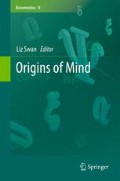Abstract
It is argued that a chief obstacle to a naturalistic explanation of the origins of mind is human exceptionalism, as exemplified in the seventeenth century by René Descartes and in the twentieth century by Noam Chomsky. As an antidote to human exceptionalism, we turn to the account of aesthetic judgment in Charles Darwin’s Descent of Man, according to which the mental capacities of humans differ from those of lower animals only in degree, and not in kind. Thoroughgoing naturalistic explanation of these capacities is made easier by shifting away from the substance-metaphysical implications of the search for an account of mind, toward a dispositional account of the origins of mindfulness.
Access this chapter
Tax calculation will be finalised at checkout
Purchases are for personal use only
Notes
- 1.
We are grateful to Jared Kinggard for alerting us to this text. See Kinggard (2010).
- 2.
We are grateful to Christine Wieseler for alerting us to the source of this observation, a letter by Descartes to the Marquis of Newcastle, November 23, 1646. Later in the same text Descartes allows, “if they [animals] thought as we do, they would have an immortal soul as we do” (Descartes 2000, 277). But this conclusion is unacceptable if one aims to provide a purely naturalistic explanation.
- 3.
This ignores, for the moment, the many fascinating attempts to teach such languages to nonhumans, of which arguably the most successful have involved not primates, but birds (see Pepperberg 2002).
- 4.
Though we have our doubts about whether it has been treated as an empirical question in the practice of comparative linguistics. If every time a new language is described that appears to violate one or another stricture of Generative Grammar, the community response is to tweak Generative Grammar to accommodate it, one begins to suspect a self-sealing argument.
- 5.
Though it can—at least in plants, where allopolyploid speciation is possible. This occurs when a hybrid, which is capable of reproduction, is not capable of breeding with either of its parent species. See e.g., Soltis and Soltis (1989).
References
Campbell, R. L., & Bickhard, M. H. (1986). Knowing levels and developmental stages (Contributions to human development). Basel: Karger.
Carmody, R. N., & Wrangham, R. W. (2009). The energetic significance of cooking. Journal of Human Evolution, 57, 379–391.
Chalmers, D. (1997). The conscious mind: In search of a fundamental theory. Oxford: Oxford University Press.
Chomsky, N. (1965). Aspects of the theory of syntax. Cambridge, MA: MIT Press.
Chomsky, N. (2009). Cartesian linguistics: A chapter in the history of rationalist thought (3rd ed.). Cambridge: Cambridge University Press.
Clark, A. (1992). The presence of a symbol (Reprinted in J. Haugeland (Ed.), Mind Design II. Cambridge: MIT Press, 1997). Cambridge, MA: MIT Press.
Darwin, C. (1859). On the origin of species. London: John Murray.
Darwin, C. (2004). The descent of man (2nd ed.). London: Penguin.
Descartes, R. (2000). Philosophical essays and correspondence. Indianapolis: Hackett.
Flanagan, O., Sarkissian, H., & Wong, D. (2007). Naturalizing ethics. In W. Sinnott-Armstrong (Ed.), Moral psychology. Cambridge, MA: MIT Press.
Gould, S. J. (1992). The Panda’s thumb: More reflections in natural history. New York: W.W. Norton.
Gould, S. J., & Eldredge, N. (1977). Punctuated equilibria: The tempo and mode of evolution reconsidered. Paleobiology, 3(2), 115–151.
Hume, D. (1999). An enquiry concerning human understanding. Oxford: Oxford University Press.
Kinggard, J. (2010). Rethinking ethical naturalism. PhD thesis, University of South Florida, Tampa.
Levine, A. (2011). Epistemic objects as interactive loci. Axiomathes, 21, 57–66.
Oyama, S., Griffiths, P. E., & Gray, R. D. (Eds.). (2003). Cycles of contingency: Developmental systems and evolution. Cambridge, MA: MIT Press.
Pepperberg, I. (2002). The Alex studies: Cognitive and communicative abilities of African grey parrots. Cambridge, MA: Harvard University Press.
Pinker, S. (2007). The language instinct: How the mind creates language (3rd ed.). New York: Harper.
Soltis, D. E., & Soltis, P. S. (1989). Allopolyploid speciation in Tragopogon: Insights from Chloroplast DNA. American Journal of Botany, 76(6), 1119–1124.
Wrangham, R. W. (2010). Catching fire: How cooking made us human. New York: Basic.
Author information
Authors and Affiliations
Corresponding author
Editor information
Editors and Affiliations
Rights and permissions
Copyright information
© 2013 Springer Science+Business Media Dordrecht
About this chapter
Cite this chapter
Winters, A.M., Levine, A. (2013). Not So Exceptional: Away from Chomskian Saltationism and Towards a Naturally Gradual Account of Mindfulness. In: Swan, L. (eds) Origins of Mind. Biosemiotics, vol 8. Springer, Dordrecht. https://doi.org/10.1007/978-94-007-5419-5_15
Download citation
DOI: https://doi.org/10.1007/978-94-007-5419-5_15
Published:
Publisher Name: Springer, Dordrecht
Print ISBN: 978-94-007-5418-8
Online ISBN: 978-94-007-5419-5
eBook Packages: Biomedical and Life SciencesBiomedical and Life Sciences (R0)

